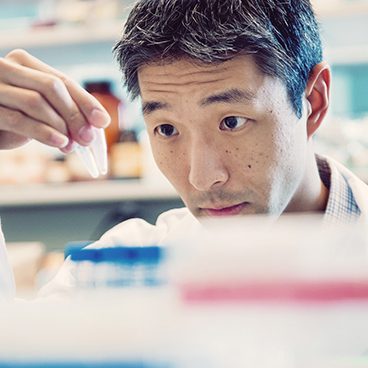
Research Interests
Platelets
Research Focus Teams
Cardiovascular, Blood, Oral Health
Departments
Oral Health Sciences, Centre for Blood Research
Contact
Email: hughkim@dentistry.ubc.ca
Office Phone: phone: 604–827–4356
Publications
Google Scholar
Lab Website
Dr. Hugh Kim, DMD, Dip Perio, MSc, PhD, FRCD(C) obtained his dental degree from the University de Montreal in 2000. After completing the dental residency program at Mount Sinai Hospital in Toronto, he commenced specialty training in Periodontics (gum disease) at the University of British Columbia (UBC) in 2001, and completed the program in 2004. He has since completed a Master degree in dental science (Msc.) at UBC. Then he completed a Doctor of Philosophy (Cell Biology) degree from the University of Toronto in 2010. Prior to returning to Vancouver, Kim completed a postdoctoral fellowship at Harvard University in Boston, Massachussetts. Dr. Kim, , has joined the Department of Oral Biological & Medical Sciences of the Faculty of Dentistry of UBC as a full time assistant professor.
Dr. Kim’s research has been continuously funded through external fellowships from the Canadian Arthritis Network, the Heart and Stroke Foundation of Canada and the Canadian Institutes of Health Research (CIHR). Kim currently holds a CIHR Clinician-Scientist Award, which supported his postdoctoral training at Harvard and will support his research at UBC. Kim is a principal investigator with the Centre for Blood Research, a research group of the Life Sciences Institute. His research is focused on platelet biochemistry; specifically, on how biochemical signals are transduced (interpreted) by the platelet’s structural framework, or cytoskeleton, and how such signals may affect platelet function, and ultimately, oral health and disease. In addition to his research activities, Dr. Kim is a practicing certified periodontist and a diplomat of the American Board of Periodontology, and he teaches at the undergraduate and graduate levels at UBC.
Dr. Kim’s research is focused on platelet biochemistry; specifically, on how biochemical signals are transduced (interpreted) by the platelet’s structural framework, or cytoskeleton, and how such signals may affect platelet function, and ultimately, oral health and disease.
TBA